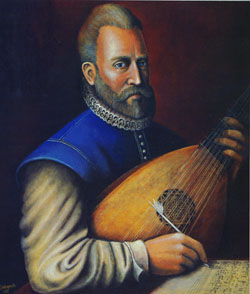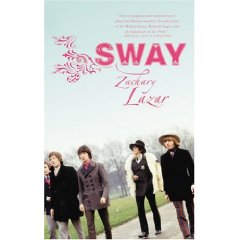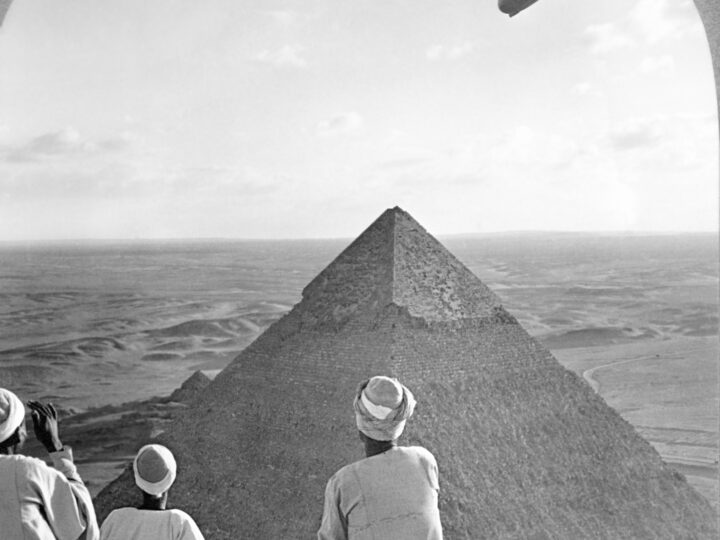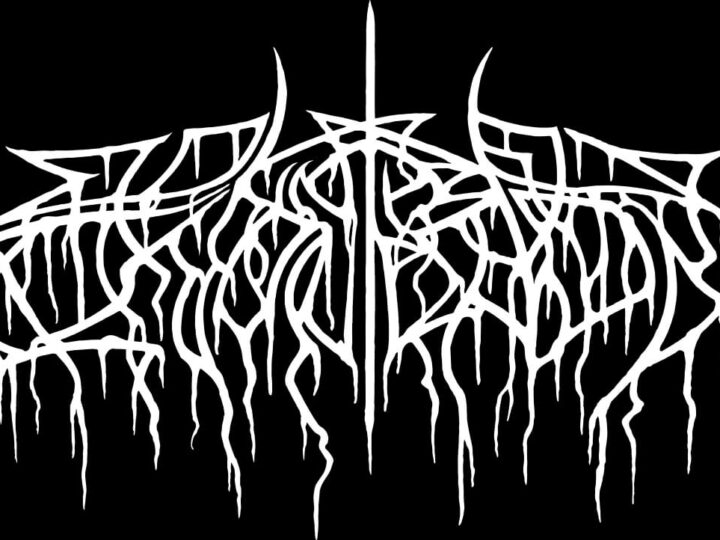
The Mopey Pleasures of John Dowland
When I listen to John Dowland, I don’t just hear a great English lutenist and composer of the late Renaissance/early modern period. I also hear the first singer-songwriter, the godfather of Leonard Cohen, Nick Drake, and Elliott Smith. Dowland wrote for the lute, for one thing, that feathery godfather of the guitar, but the real link is the creative and self-cherished melancholy that saturates songs like “I saw my Lady weep,” “Come, heavy sleep,” and the killer “In darkness let me dwell,” which is as heavy as Cohen’s “Dress Rehearsal Rag.” Whatever the reality of Dowland’s feelings—melancholy was growing hip in his era—you can’t shake the sense that the composer was a mopey, obsessive, poetic guy who wrote songs not just because he loved music, or because he had mouths to feed, but because he needed to draw the yearning and the darkness out of himself before they swallowed him up.
I first heard about Dowland by reading Philip K. Dick books as a teen, which is kind of like first getting exposed to Wagner through Warner Bros. cartoons, but weirder and sweeter. In The Divine Invasion, the singer Linda Fox—loosely based on Linda Ronstadt, who PKD also thought was a total fox—owes her intergalactic career to covers of Dowland songs; the title of 1974’s Flow My Tears, the Policeman Said is drawn from one of Dowland’s more famous songs, which also furnishes the epigraphs for the three sections of the novels, and a good taste of Dowland’s Drake-worthy sadness:
Flow my tears, fall from your springs!
Exiled forever let me mourn;
Where night’s black bird her sad infamy sings,
There let me live forlorn.
PKD was a serious classical geek, audiophile, and record collector. References to non-pop music abound in his writing, where they reflect his voracious (and autodidactical) appetite for old school Culture, which also included ancient and modern philosophy, as well as religious and lyric poetry, and especially 17th century religious poets like George Herbert and Henry Vaughn. The more time I spend with PKD, the more important this material seems to me. PKD was looking into the voracious maw of our posthuman future, even now breathing down our necks, but the eye that gazed was informed by much that is great in the humanist and religious currents of the west—and indeed, it was his desire to remain a part of those currents that provides some of the prophetic tension of his work. The network of allusions and references that PKD draws from the canon of western culture not only thicken his books into delicious hypertexts, but also lend tremendous substance to what is arguable the central concern of his fiction: the nature of the “authentically human” in a posthuman world.
Though I am not enough of an otaku to know, I suspect that Dowland gets more mentions in PKD’s corpus than any musician outside of Wagner. Why? The literary critic Harold Bloom has argued, I think persuasively, that the modern subject begins with Shakespeare—in other words, that Shakespeare invented much of the emotional, psychological, and even linguistic frameworks that construct the cage of personality most of us rattle around in for all of our days. Hamlet is the great example here—in the sad prince’s anxious self-questioning, his paralysis and meditations on agency and action, the uncanny Oedipal forces that haunt him, we recognize the lineaments of ourselves—or at least our pre-posthuman selves. Hamlet may not resemble the Terminator or anything, but he is closer to, say, Gregor Samsa than he is to anything in Spenser’s The Faerie Queene, written only a decade or so before Shakespeare’s play.
I hear a similar turn in Dowland, who was born in almost the same year as Shakespeare and died in 1626. There are tons of sad songs before Dowland, but I don’t hear in them the quality of a singular voice, the individuated kernel of feeling that unfolds itself through lyrics and plaintive musical motives. And it is not until you have a singular individual, that you can create a truly confessional song—that sense of intimate exposure that is so key to the singer-songwriter, and that I hear in lines like these, from “Weep you no more, sad fountains”:
Rest you then, rest, sad eyes,
melt not in weeping
while she lies sleeping,
softly, now softly lies
sleeping.
I have no idea what sort of performer Dowland was, whether he wore black, or sighed a lot, or was perceived to be a legendary sadsack. It doesn’t matter though—his compositions themselves convey and perform that paradoxical quality of authentic sentiment.
Its not accidental that Dowland’s dominant sentiment is melancholy, that heartsick sluggishness that became all the rage in the seventeenth century that Dowland’s popular music helped launch. Robert Burton published his Anatomy of Melancholy five years before Dowland’s death, and in the decades that followed, as Barbara Ehrenreich writes, “the European world was stricken by what looks, in today’s terms, like an epidemic of depression.” (Of course, the swift modern translation of “melancholy” into “depression” should not be undertaken automatically—there is a poetic quality of yearning in melancholy that is largely absent from more clinical accounts of depression, so much so that, in my experience anyway, depression itself can sometimes be enlivened by reframing the heaviness as aching sorrow rather than a dry void of affect or desire.)
In any case, the early moderns were definitely singing the blues, in their poetic tropes and in their sometimes suicidal feelings. There are complex reasons for this plague, but one may lie in this very emergence of the modern self, that persona that, as in Hamlet, finds itself anxious and unmoored from stable if claustrophobic certainties of the medieval mind-frame, forever without root. Melancholy manifests in part as a yearning for a lost but intimate object, a loss that in some sense founds the self. For the modern selves of the early Baroque, perhaps this lost object may be nothing else than the old holistic world that characterized medieval Europe, that dense and animated web of belief and social hierarchy, that zeitgeist bounded by an onion-shaped cosmos and the hard seasonal poetry of rural life. Melancholy is like the bilious exhaust the modern self leaves in its wake as it is ejected from the medieval matrix into a spinning infinity of self-creation and the multiplication of masks matched to a complex world defined by capitalism, the emergence of technoscience, and colonial expansion.
Of course, the modern temperament is as much about irony and self-distance as it is about personal authenticity. In its wake, the loss of the intimate object leaves nothing but the self to take its place. And so the self becomes a sort of quasi-object, exactly the subject that begins Dowland’s song “Me, me, and none but me.” The emergence of this self-object also means that there is always a gap within, the ellipsis between multiple perspectives on the self, the gap that freezes Hamlet and makes his self-analysis so delicious and so mad. Though it is impossible to know how seriously Dowland took himself and his feelings, he did leave us one ironic wink in the title of one of his more plaintive instrumental compositions. “Semper Dowland, semper dolens” is a dorky pun that means “Always Dowland, always doleful.”
As for discovering Dowland yourself, I have only a light familiarity with the pile of recordings that now exist following the composer’s rediscovery during the early music revival of the 1950s and 60s. Dowland was a dude, so I prefer counter-tenor recordings like the one Andrew Dalton made with a dynamite Japanese lutenist named Yasunori Imamura. I also get a kick out of an old Russell Oberlin recording from the late 50s that sounds super cornball. A fine and reasonably priced place to start today is Deutsche Grammaphon’s relatively recent John Dowland Collection, a two-disc anthology that not only includes a range of stellar performers but also allows you to hear the different sorts of creative and interpretive decisions that performers make. The disc includes all seven “passionate pavans” that Dowland included in “Lachrimae,” his deeply moving permutation of the song “Flow, my tears.” The Consort of Musicke, under Anthony Rooley, shines at the task, because they scrape and wheeze as they swell.
There are some beautiful vocal performances here as well, especially Andrea von Ramm and the heavy-weight Anne Sofie von Otter, whose name sounds drawn from a Pynchon book. That’s good because Von Otter gets to do “In Darkness Let Me Dwell,” my favorite Dowland song; though she is not as jarring as she could be on the “jarring sounds” lyric, she squeezes all the spooky power of the song’s final melodic line, which drops against a background of silence after the lute’s final unresolved chord fades. Neither of these ladies succumb to the excess of vibrato that mars a lot of the singing here. There is a time and a place for singers to hit the whammy bar of their vocal cords, but these songs, like so much early music, sometimes demand a smoother and plainer articulation than they usually get. (The dominance of vibrato in classical music over the last century may be anomalous; it’s a controversial topic.) While I have no use for the rock god Sting’s gussied-up 2006 Dowland collection Songs from the Labyrinth (also on Deutsch Grammaphon), I do admire, along with the singer’s audacity and his obvious Dowland fandom, his attempt to sing these songs straight, like the sad pop songs they perhaps were meant to be.




